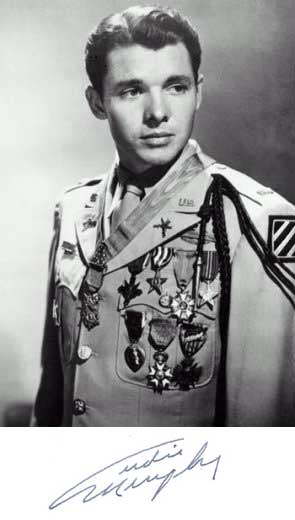(No. 1 World War II Hero)

1ST Lt. Audie Murphy with all his medals.
In the Arlington National Cemetery, on the banks of the Potomac River, are rows of tombstones with the names of soldiers who fought bravely and sacrificed greatly to preserve our American way of life. One name stands out above all the others. It is the name of Audie Murphy. He was the son of a poor Texas sharecropper who rose to national fame as the most decorated U.S. combat soldier of World War II. Among his 33 awards and decorations was the Medal of Honor, the highest military award for bravery that can be given to any individual in the United States of America for “conspicuous gallantry and intrepidity at the risk of his life above and beyond the call of duty”.
He also received every decoration for valor that his country had to offer, some of them more than once and five decorations by France and Belgium. Credited with killing over 240 of the enemy while wounding and capturing many others, he became a legend with the 3rd Infantry Division. Beginning his service as an Army Private, Audie quickly rose to the enlisted rank of Staff Sergeant, was given a “battlefield” commission as 2nd Lieutenant, was wounded three times, fought in 9 major campaigns across the European Theater, and survived the war. Today his grave site at Arlington is the second most visited year around. President Kennedy’s grave is the most visited.
On September 21, 1945, Audie was released from the Army as an active member and reassigned to inactive status. Seeing Audie’s photo on the cover of Life Magazine, actor James Cagney invited Murphy to Hollywood. His first starring role came in a 1949 released film by Allied Artists called, Bad Boy. Over the next 15 years he starred in 26 films, 23 of them westerns. In 1949 he wrote his autobiography To Hell and Back, which became a best seller. In 1955 Murphy starred as himself in the film version by the same name. This movie held the record as Universal’s highest grossing picture until 1975 when it was finally surpassed by Jaws. He went on to make a total of 44 movies.
Audie suffered from what is now know as Post Traumatic Stress Disorder (PTSD) and was plagued by insomnia and depression. Always the advocate for the needs of veterans, he broke the taboo about discussing war related mental problems. In an effort to draw attention to the problems of returning Korean and Vietnam War veterans, Audie Murphy spoke-out candidly about his personal problems with PTSD, then known as “Battle Fatigue”. He called for the U.S. Government to give more consideration and study to the emotional impact war has on veterans.
While on a business trip on May 28, 1971, he was killed when the private plane he was flying in crashed in heavy fog near Roanoke, Virginia. Here ended the life of a movie star and a war hero.
